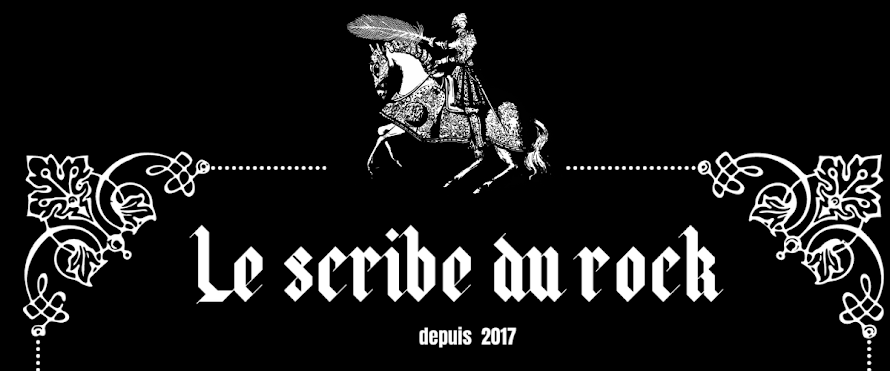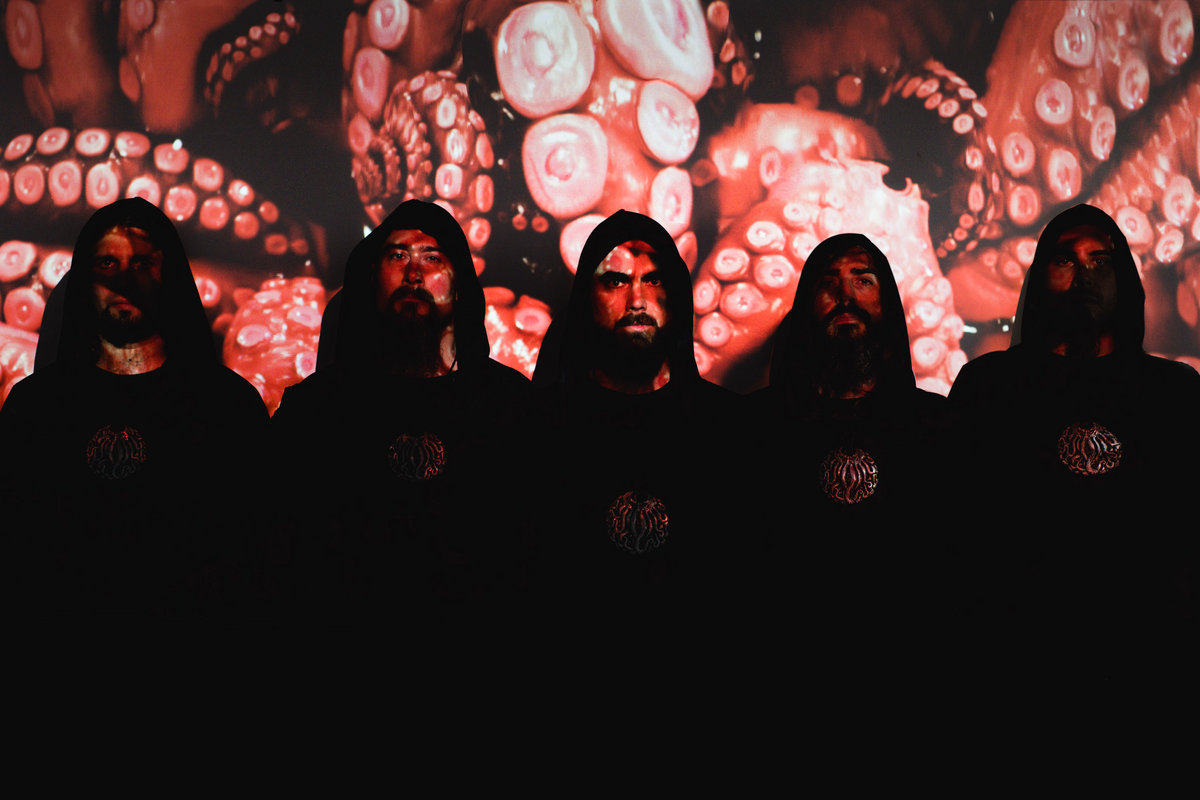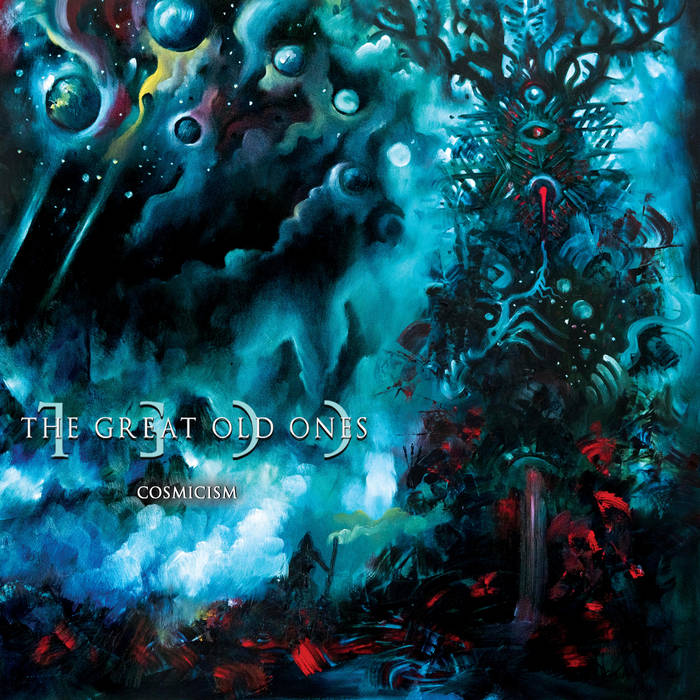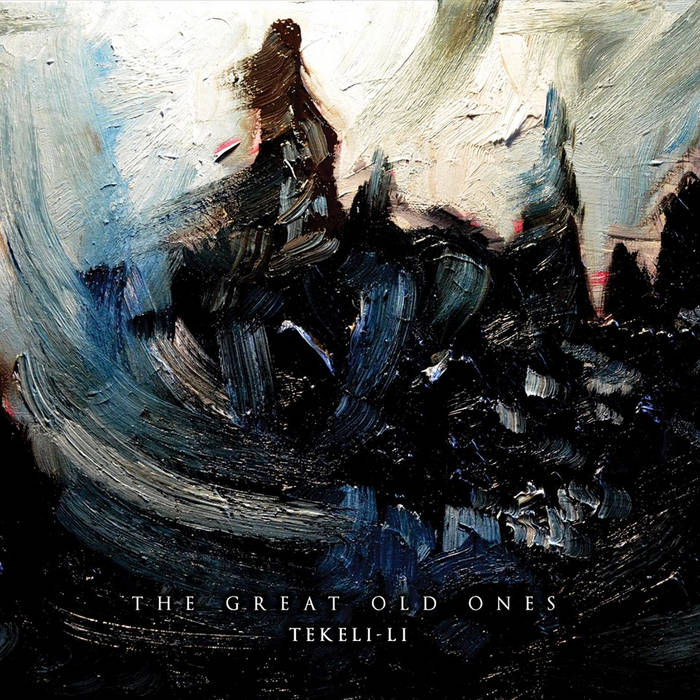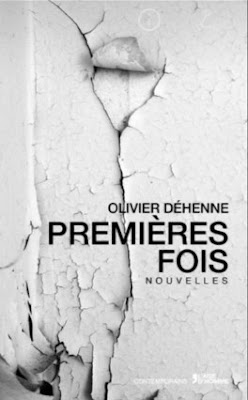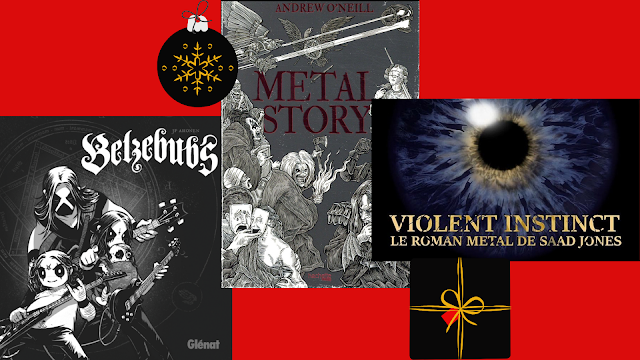A Cosmic Journey : Interview avec THE GREAT OLD ONES - French + English Text - Lovecraftian Post-Black Metal
Entretien avec Benjamin, vocaliste et guitariste dans The Great Old Ones. Nous abordons la carrière du groupe album par album, en commençant par le dernier né, "Cosmicism", mais aussi l'influence de Lovecraft pour le groupe, les différents sous genres du black metal et bien d'autres choses encore...
“Ce qui est, à mon sens, pure miséricorde en ce monde, c'est l'incapacité de l'esprit humain à mettre en corrélation tout ce qu'il renferme. Nous vivons sur une île de placide ignorance, au sein des noirs océans de l'infini, et nous n'avons pas été destinés à de longs voyages. Les sciences, dont chacune tend dans une direction particulière, ne nous ont pas fait trop de mal jusqu'à présent ; mais un jour viendra où la synthèse de ces connaissances dissociées nous ouvrira des perspectives terrifiantes sur la réalité et la place effroyable que nous y occupons ; alors cette révélation nous rendra fous, à moins que nous ne fuyions cette clarté funeste pour nous réfugier dans la paix et la sécurité d'un nouvel âge de ténèbres.”HP. LOVECRAFT (1890-1937)
Entretien avec Benjamin Guerry (guitare, chant)
Merci à vous, grands anciens, de répondre à mes questions ! “Cosmicism” votre nouvel album, est sorti en 2019... que pouvez vous nous en dire ?
Salut Pierre,
Et bien nous sommes vraiment très satisfaits des retours que les auditeurs nous ont fait sur “Cosmicism”. Cet album a représenté beaucoup de travail, et une vraie plongée dans nos subconscients pour proposer un voyage qui va au-delà de la simple musique. Nous avons testé de nouveaux éléments, passé beaucoup de temps en studio pour peaufiner l’ensemble, et le public semble avoir compris notre démarche. Nous avons eu la chance de pouvoir faire au moins une tournée française, en compagnie de nos amis d’Au Champs des Morts, avant la pandémie, et toutes les dates ont été excellentes.
Toujours fidèles a vos thématiques “lovecraftiennes” vous nous embarquez cette fois aux confins de l’espace. Pouvez vous nous en dire un peu plus sur le concept de cet album ? Avez vous trouvé la cache des grands anciens ?
BG : Tout l’album est basé sur la philosophie littéraire lovecraftienne qu’est le cosmicisme. L’auteur, au travers de ces écrits, explique que l’Homme n’est rien à l’échelle de l’univers, et qu’il n’a pas conscience des enjeux et évènements qui se déroulent en son sein. C’est aussi pour cela que la folie tient une place très importante dans son oeuvre car l’être humain n’est pas fait pour comprendre ces choses, et quand il en a un bref aperçu, il ne peut que sombrer dans la démence.
Chaque morceau raconte la rencontre d’un protagoniste avec une entitée lovecraftienne, et expose ses émotions, que ce soit de la fascination, de la tristesse, de la folie, ou même la mort. Le cosmicisme est le fil rouge à toutes ces histoires.
Cet album est splendide, il ressemble a un aboutissement aussi bien en termes de composition, que d’interprétation et de son (le mix est splendide). Comment expliquez vous cela ? A t’il nécessité encore plus de travail que les précédents ?
BG : C’est un album qui a demandé beaucoup de travail de composition, ainsi que beaucoup de remise en question. La volonté de ne pas se répéter est forte, et cela nécessite beaucoup de boulot. Mais TGOO a un line up qui n’a jamais été aussi fort et soudé, autant techniquement qu’au niveau de la sensibilité musicale, et cela nous a permis d’expérimenter, et d’ouvrir de nouvelles perspectives. Nous avons été immergés un mois en studio, loin de chez nous, nous permettant de nous concentrer à 100% à notre travail. Je dois d’ailleurs saluer le boulot de Francis Caste qui représente une grande part de la réussite de cette album. Il lui confère une ambiance bien particulière et singulière.
Dix ans déjà que vous distillez ce mélange si réussi de Lovecraft, de Black Metal, de Shoegaze, de Post-Core et de Post-Black ! Pouvez vous revenir pour nous sur les fondations de la bête ?
BG : J’ai démarré le projet seul, sans vraiment d’autres objectifs que de me faire plaisir, et de composer la musique que j’avais en tête : un black metal atmosphérique, invitant au voyage, mais aussi sombre et mélancolique. Rapidement, j’ai fait un parallèle entre les chansons que j’écrivais et l’univers de Lovecraft, et le lien entre les deux est devenu une évidence. Nous avons ensuite signé avec LADLO dès le premier album “Al Azif” ce qui, grâce à leur travail passionné et exceptionnel, nous a permis de toucher un grande nombre d’auditeurs, et de participer à de gros festivals alors que la carrière du groupe venait de démarrer (Hellfest, Motocultor, Roadburn, etc.). Nous avons depuis signé avec Season of Mist, ce qui a été un sacré pas en avant.
Depuis, le line up a beaucoup bougé, TGOO demandant beaucoup d’investissement parfois compliqué à gérer avec sa vie personnelle et ses envies, mais chaque personne a apporté sa pierre à l’édifice, et rien n’aurait été possible sans tout ces gens.
La volonté de mettre Lovecraft en musique reste intacte, et nous avons encore beaucoup de projets passionnants sur le feu !
D'où est venue l'inspiration lovecraftienne dans un premier temps ?
BG ; Comme je l’expliquais plus haut, cette inspiration est venue assez naturellement. Je suis fan de Lovecraft depuis mon adolescence, que j’ai découvert grâce au jeu de role “l’Appel de Cthulhu”, et j’ai toujours été fasciné par son univers, les lieux qu’il décrit, et les entités qu’il évoque. Quand j’écoutais les premiers morceaux que j’avais composé, je retrouvais tout cela, et un autre sujet n’était plus possible. Depuis Lovecraft nous accompagne où que nous allons, dans nos albums, et dans nos concerts.
Dès Al Azif en 2012, on sent tout de suite qu'on a affaire avec un groupe qui n'a rien de commun. Ces sonorités à la fois denses et mélodieuses, ce mélange de mélancolie et de beauté pure. Comment avez vous travaillé cet album ?
BG : Comme tout premier album, rien n’était réfléchi. Même si nous avions tous déjà joué dans d’autres groupes depuis un bon moment, nous apprenions sur le moment à dompter notre concept, le peaufiner, le faire prendre de l’ampleur. Nous venions d’horizons parfois différents, et cela nous enlevait toute limite à l’expérimentation, que ce soit au niveau du son que du reste. Je crois que le public a été sensible à cette manière de faire, laissant libre court aux émotions brutes.
Quelles étaient vos principales influences musicales à vos débuts ?
BG : C’est assez classique comme réponse mais les influences étaient, et sont toujours, très nombreuses, et ce dans un panel de styles très vaste. Il y avait bien entendu les classiques du black metal comme Emperor et Enslaved mais aussi des formations de Post Hardcore avec par exemple Cult of Luna et Neurosis. Je me souviens aussi avoir été particulièrement happé par l’atmosphère des albums de Wolves in the Throne Room, qui savait lié l’aspect rugueux du black metal avec un côté très spirituel.
Votre reprise de “Bachelorette” de Bjork (une de mes chansons préférées de tous les temps ! NdS) est un bijou. Comment s'est opérée la transformation de cette “tragic symphonic pop song” en Doom/Core écrasant et suffocant ?
BG : Nous devions partir en tournée et celle-ci avait été annulée au dernier moment. Afin de conjurer le sort, il nous fallait faire quelque chose, et de préférence quelque chose de différent. “Bachelorette” est une chanson qui possède une ambiance bien à elle, un ton dramatique très fort et ces éléments collent pour moi parfaitement avec la musique de TGOO. Il y a eu un gros travail de réinterprétation du morceau original car certains passages sont très épurés musicalement parlant. Il nous fallait aussi respecter les mélodies du chant de Bjork car elles représentent une grande partie de la charge émotionnelle du titre. Même s’il y a quelques moments rapides, la lourdeur a pris le dessus, pour provoquer une transe, une transcendance.
Comme chez Lovecraft, l'ambiance est chose prépondérante dans votre musique. Comment travaillez vous cet aspect ? Faut il se “mettre en condition” avant de composer ?
BG : Généralement, le concept et la musique d’un album de TGOO arrivent en même temps. Il faut se plonger dans les écrits de Lovecraft pour assimiler les atmosphères, connaitre les émotions qu’il faut exprimer. Une fois cela bien assimilé, il faut laisser parler son esprit, ne pas trop réfléchir car le cerveau met généralement des barrières un peu partout. En les faisant sauter, nous ressentons des émotions très fortes en composant. D’ailleurs, nous écrivons notre musique pour nous-même dans un premier temps, sans réfléchir à la réaction de telle ou telle personne extérieure au groupe. Mais nous partons du principe que si un passage nous touche, il devrait en être de même pour notre public. Et si les images qu’il nous évoque sont purement lovecraftiennes, c’est que ce passage est le bon.
Tekeli-li, votre deuxième album, est sorti en 2014. Pas facile de succéder à un premier album aussi abouti d'emblée ! Avez vous ressenti une certaine “pression” pour composer celui-là ? Après les fonds marins de R'lyeh sur le 1er lp, vous abordez ici le froid, la glace, les montagnes hallucinées. Musicalement votre Black Atmosphérique semble s'épanouir encore avec une lourdeur sidérante, des poussées d'adrenaline bienvenues...Cet album est vraiment noir et oppressant...Pouvez vous nous en parler ?
BG : Je pense que le fait de se baser sur une nouvelle complète pour l’écriture de cet album a permis une nouvelle fois de faire venir les choses naturellement. Il y avait un fil conducteur, une narration à respecter, et surtout aucune pression. Même si “Al Azif” avait bien marché, nous étions (et nous le sommes encore aujourd’hui) totalement libres de nos choix artistiques. Nous avons donc poussé le concept un peu plus loin, en incluant des voix parlées dans le style d’un audiobook, ainsi qu’un morceau final de 18 minutes. En a résulté un album complet et coherent, suivant les émotions du protagoniste de la nouvelle, et le public a complètement adhéré à cela. “Tekeli-li” est assurement un album clé de notre carrière.
Quelle est votre point de vue sur la scène française “post-BM” pourrait on dire, avec Regarde les Hommes Tomber, Demande à la Poussière (avec lesquels vous avez partagé des hommes et des sons), Cepheide, Time Lurker ou Nature Morte ? Avez vous des groupes que vous souhaitez nous faire découvrir ?
BG : La scène française a toujours été forte, et riche en expérimentations. Mais il faut dire que depuis une dizaine d’années, sa portée internationale s’est intensifiée, avec notamment les groupes que tu cites. C’est d’ailleurs aussi le cas pour d’autres styles de metal, extrême ou non. Je les ai cité plus haut mais l’album “Dans la Joie” de Au Champs des Morts est vraiment incroyable. Je ne me lasse pas du morceau titre !
EOD : A tale of Dark Legacy voit le jour en 2017. Cette fois vous vous intéressez à la sombre ville lovecraftienne d'Innsmouth. J'ai trouvé cet album plus agressif et plus “Black Metal” que les précédents. Etait-ce une volonté d'un retour à des fondamentaux ?
BG : Il y avait effectivement une envie de proposer une image plus sombre et violente de la musique de TGOO. Et cela collait parfaitement à l’ambiance de la ville d’Innsmouth, entièrement tournée vers le culte de Dagon. Cela se ressent aussi au niveau de la production. J’ai écris les textes comme une sorte de suite à la nouvelle originale, avec un côté parfois plus explicites que le faisait Lovecraft. La musique se devait être plus aggressive, plus directe, pour apprehender plus intensément les émotions qui traversent le personnage principal de l’histoire, jusqu’à son lacher-prise final, et l’acceptation de son destin tragique.
Parlons de la scène...comment envisagez vous cette part du “métier” ?
BG : La scène est pour nous un élément essentiel. Nous faisons des albums aussi pour interpreter les morceaux en live, et leur donner une autre couleur. Car si nos disques proposent des experiences très personnelles, le live apporte une intensité et une agressivité supplémentaire. Bien sûr, nous travaillons beaucoup pour garder une atmosphère forte, et proposer de vrais shows lovecraftiens, que ce soit au niveau visuel, des lumières, et du son.
Vos 20 albums préférés de tous les temps et dans tous les styles ?
Difficile de choisir et je ne parlerai que pour moi mais :
Metallica : Master of Puppets
Metallica : Ride The Lighting
Emperor : In The Nightside Eclipse
Emperor : Anthems to the Welkin At Dusk
Opeth : Blackwater Park
Satyricon : Nemesis Divina
Mayhem : De Mysteriis Dom Sathanas
Deathspell Omega : Paracletus
Empyrium : Weiland
Ulver : Shadows of the Sun
Deftones : White Poney
Black Sabbath : Master of Reality
Cult of Luna : Eternal Kingdom
Hexvessel : No Holier Temple
Queen : Innuendo
Smashing Pumpkins : Mellon Collie and the Infinite Sadness
Eddie Vedder : Into the Wild (bo)
Vangelis : Blade Runner (bo)
Jean-Michel Jarre : Oxygen
Toute l’oeuvre de Chopin
Si je vous dis :
RABM vs NSBM ?
Post-BM ?
Blackened Crust ?
Black/Death/War Metal ?
Black'n'Roll ?
Cosmic Black Metal ?
Ça vous inspire quoi ?
BG :
RABM vs NSBM : Aucun des deux. Pour être honnête, je peux comprendre que le black metal ai toujours analysé et mis en musique la haine, le rejet de l’autre, la misanthropie. C’est aussi ce qui a crée le style. Mais je ne peux pas cautionner ce qui, pour moi, sort de l’artistique et fait les louanges d’actes immondes et de pensées qui ne me correspondent pas. Le rejet de la religion oui, l’atteinte à la liberté de vivre non.
Post-BM : un style qui avait du sens il y a 10 ans, et beaucoup moins maintenant car il y a énormément de groupe qui sont catégorisés comme cela, et qui n’ont absolument rien à voir.
Blackened Crust : Le mélange de deux styles est intéressant. Revenir à quelque chose de plus primaire, plus sale et plus direct procure toujours des émotions fortes.
Black/Death/War Metal : Si à une époque les styles étaient bien dissociés, maintenant tout ce mélange mais je trouve que cela permet de voir apparaître des groupes passionnants, prenant le meilleur de tous ces styles.
Black'n'Roll : Je ne suis pas un expert de cette catégorie. Mais le rock and roll est à la base de notre musique, et y inclure son groove peut donner des choses intéressantes, sans renier l'agressivité du black metal.
Cosmic Black Metal : Le black metal fait voyager, tout du moins intérieurement. Représenter le cosmos au travers de la musique est un élément très fort, et ce style de musique permet de toucher du doigt un endroit dans lequel nous ne pouvons pas aller physiquement. C’est bien sûr chaque fois une interprétation de l’artiste qui propose sa propre vision mais l’imaginaire permet souvent d’explorer des lieux inatteignables.
Si The Great Old Ones étaient une citation ? (de Lovecraft ou pas !)
“Ce qui est, à mon sens, pure miséricorde en ce monde, c'est l'incapacité de l'esprit humain à mettre en corrélation tout ce qu'il renferme. Nous vivons sur une île de placide ignorance, au sein des noirs océans de l'infini, et nous n'avons pas été destinés à de longs voyages. Les sciences, dont chacune tend dans une direction particulière, ne nous ont pas fait trop de mal jusqu'à présent ; mais un jour viendra où la synthèse de ces connaissances dissociées nous ouvrira des perspectives terrifiantes sur la réalité et la place effroyable que nous y occupons ; alors cette révélation nous rendra fous, à moins que nous ne fuyions cette clarté funeste pour nous réfugier dans la paix et la sécurité d'un nouvel âge de ténèbres.”
HP. LOVECRAFT (1890-1937)
Espace vierge : ajoutez ce que vous voulez :
BG : Merci pour l’interview, et à bientôt sur la route, dès que la situation nous le permettra !
Merci Benjamin
Interview with Benjamin, vocalist and guitarist in The Great Old Ones. We approach the band's career album by album, starting with the latest album, "Cosmicism", but also the influence of Lovecraft on the band, the different sub genres of black metal and much more...
"What is, in my opinion, pure mercy in this world is the inability of the human mind to correlate everything in it. We live on an island of placid ignorance, within the black oceans of infinity, and we have not been destined for long journeys. The sciences, each of which tends in a particular direction, haven't done us too much harm so far; but the day will come when the synthesis of this dissociated knowledge will open up terrifying perspectives on reality and the appalling place we occupy in it; then this revelation will drive us mad, unless we flee from this disastrous clarity to take refuge in the peace and security of a new age of darkness".HP. LOVECRAFT (1890-1937)
Interview with Benjamin Guerry (guitar, vocals)
Thank you, for answering my questions! "Cosmicism", your new album, was released in 2019... what can you tell us about it ?
Hi Pierre,
Well, we are really very satisfied with the feedback that the listeners gave us on "Cosmicism". This album represented a lot of work, and a real dive into our subconscious to propose a journey that goes beyond simple music. We tested new elements, spent a lot of time in the studio to fine-tune the whole thing, and the audience seems to have understood our approach. We were lucky enough to be able to do at least one French tour, with our friends from Au Champs des Morts, before the pandemic, and all the dates were excellent.
Always faithful to your "lovecraftian" themes, this time you take us to the edge of space. Can you tell us a bit more about the concept of this album ? Did you find the cache of the great elders ?
BG: The whole album is based on the Lovecraftian literary philosophy of cosmicism. The author, through his writings, explains that Man is nothing on the scale of the universe, and that he is unaware of the issues and events taking place within it. This is also why madness holds a very important place in his work because the human being is not made to understand these things, and when he has a brief glimpse of them, he can only sink into dementia.
Each piece tells the story of a protagonist's encounter with a Lovecraftian entity, and exposes his emotions, be it fascination, sadness, madness, or even death. Cosmicism is the common thread to all these stories.
This album is splendid, it looks like an achievement in terms of composition, interpretation and sound (the mix is splendid). How do you explain this ? Did it require even more work than the previous ones ?
BG: It is an album that required a lot of composition work, as well as a lot of questioning. The will not to repeat itself is strong, and that requires a lot of work. But TGOO has a line up that has never been so strong and united, both technically and in terms of musical sensitivity, and this has allowed us to experiment and open new perspectives. We were immersed for a month in the studio, far from home, allowing us to concentrate 100% on our work. I must also salute the work of Francis Caste, who represents a large part of the success of this album. It gives it a very special and singular atmosphere.
You've been distilling this successful blend of Lovecraft, Black Metal, Shoegaze, Post-Core and Post-Black for ten years already! Can you come back for us on the foundations of the beast?
BG: I started the project on my own, with no real objectives other than to enjoy myself and to compose the music I had in mind: atmospheric black metal, inviting to travel, but also dark and melancholic. Quickly, I drew a parallel between the songs I was writing and the Lovecraft universe, and the link between the two became an evidence. We then signed with LADLO as soon as the first album "Al Azif" which, thanks to their passionate and exceptional work, allowed us to reach a large number of listeners, and to participate in big festivals when the band's career had just started (Hellfest, Motocultor, Roadburn, etc.). We've since signed with Season of Mist, which was quite a step forward.
Since then, the line up has moved a lot, TGOO requiring a lot of investment, sometimes complicated to manage with one's personal life and desires, but each person has contributed his or her share, and nothing would have been possible without all these people.
The will to put Lovecraft to music remains intact, and we still have many exciting projects on the go!
Where did the Lovecraft inspiration come from in the first place?
BG; As I explained above, this inspiration came quite naturally. I've been a fan of Lovecraft since I was a teenager, which I discovered through the role-playing game "The Call of Cthulhu", and I've always been fascinated by its universe, the places it describes, and the entities it evokes. When I listened to the first pieces I had composed, I found all this again, and another subject was no longer possible. Since then, Lovecraft accompanies us wherever we go, in our albums, and in our concerts.
From Al Azif in 2012, you immediately feel that you are dealing with a group that has nothing in common. These sounds are both dense and melodious, a mixture of melancholy and pure beauty. How did you work on this album?
BG: Like any first album, nothing was thought out. Even though we had all been playing in other bands for quite a while, we were learning at the time how to tame our concept, how to refine it, how to make it grow. We came from different backgrounds sometimes, and that took the experimentation out of our hands, both in terms of sound and everything else. I think the audience was sensitive to this way of doing things, giving free rein to raw emotions.
What were your main musical influences at your beginnings?
BG: That's a fairly classical answer, but the influences were, and still are, very numerous, in a very wide range of styles. There were of course black metal classics like Emperor and Enslaved but also Post Hardcore bands like Cult of Luna and Neurosis. I also remember being particularly taken by the atmosphere of the Wolves in the Throne Room albums, which knew how to link the rough aspect of black metal with a very spiritual side.
Your cover of Bjork's "Bachelorette" (one of my all-time favorite songs! NdS) is a gem. How was the transformation of this "tragic symphonic pop song" into a crushing and suffocating Doom/Core ?
BG: We were supposed to go on tour and it was cancelled at the last moment. In order to break the spell, we had to do something, preferably something different. "Bachelorette" is a song that has its own atmosphere, a very strong dramatic tone and these elements fit perfectly with TGOO's music for me. There has been a lot of reinterpretation of the original song because some passages are very clean musically speaking. We also had to respect the melodies of Bjork's song because they represent a large part of the emotional charge of the title. Even if there are some quick moments, the heaviness took over, to provoke a trance, a transcendence.
As with Lovecraft, the mood is a major factor in your music. How do you work on this aspect ? Is it necessary to "get in condition" before composing ?
BG: Usually, the concept and music for a TGOO album come together at the same time. You have to immerse yourself in Lovecraft's writings to assimilate the atmospheres, to know the emotions you need to express. Once this is well assimilated, you have to let your mind speak, not to think too much because the brain generally puts barriers everywhere. By blowing them up, we feel very strong emotions while composing. Moreover, we write our music for ourselves at first, without thinking about the reaction of this or that person outside the group. But we assume that if a passage touches us, it should also touch our audience. And if the images it evokes for us are purely lofraftian, it's because that passage is the right one.
Tekeli-li, your second album, was released in 2014. It's not easy to succeed such a successful first album right away! Did you feel a certain "pressure" to compose this one? After the seabed of R'lyeh on the 1st lp, here you approach the cold, the ice, the hallucinated mountains. Musically your Black Atmosphere seems to blossom again with a staggering heaviness, welcome adrenaline rushes...This album is really black and oppressive...Can you tell us about it ?
BG: I think that basing the writing of this album on a complete short story has once again made things come naturally. There was a common thread, a narrative to follow, and above all no pressure. Even if "Al Azif" had worked well, we were (and still are) totally free in our artistic choices. So we took the concept a bit further, including spoken voices in the style of an audiobook, and a final 18-minute track. The result was a complete and coherent album, following the emotions of the protagonist of the short story, and the audience completely adhered to it. "Tekeli-li" is definitely a key album of our career.
What's your point of view on the French "post-BM" scene, one could say, with Regarde les Hommes Tomber, Demande à la Poussière (with whom you shared men and sounds), Cepheide, Time Lurker or Nature Morte ? Do you have any bands you would like us to discover ?
BG: The French scene has always been strong and rich in experimentation. But it must be said that in the last ten years or so, its international reach has intensified, especially with the bands you mention. This is also the case for other styles of metal, extreme or not. I mentioned them above but the album "Dans la Joie" from "Au Champs des Morts" is really incredible. I can't get tired of the title track !
EOD : A tale of Dark Legacy is released in 2017. This time you're interested in the dark, dark city of Innsmouth. I found this album more aggressive and more "Black Metal" than the previous ones. Was it a desire to go back to basics ?
BG: There was indeed a desire to propose a darker and more violent image of TGOO's music. And it fit in perfectly with the atmosphere of the city of Innsmouth, which is entirely oriented towards the cult of Dagon. This is also felt at the production level. I wrote the lyrics as a kind of sequel to the original short story, with a side that was sometimes more explicit than Lovecraft did. The music had to be more aggressive, more direct, in order to understand more intensely the emotions that run through the main character of the story, up to his final release, and the acceptance of his tragic destiny.
Let's talk about the scene...how do you envision this part of the "job"?
BG: The scene is an essential element for us. We also make albums to interpret the songs live and give them a different color. Because while our records offer very personal experiences, live brings an extra intensity and aggressiveness. Of course, we work a lot to keep a strong atmosphere, and to offer real live shows, whether it's on the visual level, lights, and sound.
Your 20 favorite albums of all times and in all styles ?
It's hard to choose and I will only speak for myself but :
Metallica : Master of Puppets
Metallica: Ride The Lighting
Emperor: In The Nightside Eclipse
Emperor: Anthems to the Welkin At Dusk
Opeth: Blackwater Park
Satyricon : Nemesis Divina
Mayhem : De Mysteriis Dom Sathanas
Deathspell Omega: Paracletus
Empyrium: Weiland
Ulver: Shadows of the Sun
Deftones : White Pony
Black Sabbath: Master of Reality
Cult of Luna : Eternal Kingdom
Hexvessel : No Holier Temple
Queen: Innuendo
Smashing Pumpkins: Mellon Collie and the Infinite Sadness
Eddie Vedder : Into the Wild (bo)
Vangelis : Blade Runner (bo)
Jean-Michel Jarre: Oxygen
All of Chopin's work
If I tell you :
RABM vs NSBM ?
Post-BM?
Blackened Crust ?
Black/Death/War Metal ?
Black'n'Roll ?
Cosmic Black Metal ?
What does it inspire you?
BG :
RABM vs NSBM: Neither. To be honest, I can understand that black metal has always analyzed and set to music hatred, rejection of the other, misanthropy. That's also what created the style. But I can't endorse what, for me, is out of the artistic and praises filthy acts and thoughts that don't fit me. The rejection of religion yes, the attack on the freedom to live no.
Post-BM: a style that made sense 10 years ago, and much less now because there are a lot of groups that are categorized like that, and that have absolutely nothing to do with it.
Blackened Crust: The mix of two styles is interesting. Going back to something more primary, dirtier and more direct always brings strong emotions.
Black/Death/War Metal : If at one time the styles were well dissociated, now all this mixing but I find that it allows us to see exciting bands appearing, taking the best of all these styles.
Black'n'Roll : I'm not an expert in this category. But rock and roll is at the base of our music, and including its groove can give interesting things, without denying the aggressivity of black metal.
Cosmic Black Metal : Black metal makes you travel, at least internally. Representing the cosmos through music is a very strong element, and this style of music allows us to touch with our fingers a place where we can't physically go. It is of course each time an interpretation of the artist who proposes his own vision, but the imagination often allows us to explore unreachable places.
What if The Great Old Ones were a quote? (from Lovecraft or not!)
"What is, in my opinion, pure mercy in this world is the inability of the human mind to correlate everything in it. We live on an island of placid ignorance, within the black oceans of infinity, and we have not been destined for long journeys. The sciences, each of which tends in a particular direction, haven't done us too much harm so far; but the day will come when the synthesis of this dissociated knowledge will open up terrifying perspectives on reality and the appalling place we occupy in it; then this revelation will drive us mad, unless we flee from this disastrous clarity to take refuge in the peace and security of a new age of darkness".
HP. LOVECRAFT (1890-1937)
Blank space: add what you want :
BG: Thanks for the interview, and see you on the road, as soon as the situation allows it!
Thanks Benjamin !
